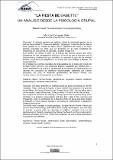| dc.contributor.author | Rodríguez-Soto, Maritza | |
| dc.date.accessioned | 2020-11-03T19:11:40Z | |
| dc.date.available | 2020-11-03T19:11:40Z | |
| dc.date.issued | 2010-06 | |
| dc.identifier.issn | 1409-3928. | |
| dc.identifier.other | https://www.revistas.una.ac.cr/index.php/abra/article/view/3829/3673 | |
| dc.identifier.uri | http://hdl.handle.net/11056/18497 | |
| dc.description.abstract | El artículo presenta un análisis, desde la psicología grupal, de la película denominada “La Fiesta de Babette”, dirigida por el director danés Gabriel Axel, basada en el cuento de Karen Blixen, ganadora del Oscar a la mejor película extranjera en 1987, que se desarrolla en la costa occidental de Dinamarca, en la provincia de Jutlandia, durante el siglo XIX.
Este análisis se realiza a partir de la lectura del proceso grupal que viven integrantes de una congregación religiosa y la forma en que se vinculan ante lo desconocido y amenazante que simboliza el banquete al que les ha invitado Babette, mujer francesa refugiada en la casa de dos hijas, Philippa y Martina, del pastor fallecido.
En el trabajo se retoman conceptos del psicoanálisis, de la teoría del vínculo de Enrique Pichon Riviere y los supuestos básicos trabajados por Wilfred Bion, y como interfieren en la tarea y el aprendizaje de los grupos. De igual manera, se retoman los conceptos de obstáculo epistemológico elaborado por Gaston Bachelard, así como el obstáculo epistemofílico de Pichon Riviere, sus implicaciones en el vínculo grupal y los afectos. | es_ES |
| dc.description.abstract | The article presents an analysis
based on
group psychology of the film
"Babette's Feast"
,
directed by Danish director Gabriel Axel, based on the story
by
Karen Blixen
.
An
Oscar
Winner
for best foreign film in 1987,
the film
takes place
on the west
ern
coast of Denmark, in the province of Jutland, in the
19th
century.
This analysis is based on t
he reading
of the
group process
experienced
by
some
members of a religious congregation and how they
relate
to the unknown and
threatening
, which is symbolized
by
a
feast
to which the group has been invited
by
Babette,
a
French woman refugee in the house
of
a
dead pastor ́s
daughters,
Philippa and Martin
e
.
This study
uses
concepts of psychoanalysis,
Enrique
Pichon
-
Rivière ́s
teoría del
vínculo
(
attachment theory
),
and
Wilfred Bion ́s
basic assumptions, and
how they
all
interact
in group
work and learning.
In
addition
, concepts
such as
the
epistemological obstacle
developed
by Gaston Bachelard and the
epistemophilic
obstacle
developed by
Pichon
Riviè
re
are mentioned, as well as
their
implications
in group ties
and affection | es_ES |
| dc.description.sponsorship | Universidad Nacional, Costa Rica | es_ES |
| dc.language.iso | spa | es_ES |
| dc.publisher | Editorial de la Universidad Nacional | es_ES |
| dc.rights | Acceso abierto | es_ES |
| dc.rights.uri | http://creativecommons.org/licenses/by-nc-sa/4.0/ | * |
| dc.source | Revista ABRA Vol. 30, No. 40, p. 1-6 | es_ES |
| dc.subject | PICHON-RIVIÈRE | es_ES |
| dc.subject | IDENTIFICACIÓN | es_ES |
| dc.subject | SUPUESTOS BÁSICOS | es_ES |
| dc.subject | OBSTÁCULO EPISTEMOLÓGICO | es_ES |
| dc.subject | OBSTÁCULO EPISTEMOFÍLICO | es_ES |
| dc.subject | PICHON-RIVIÈRE | es_ES |
| dc.subject | IDENTIFICATION | es_ES |
| dc.subject | BASIC ASSUMPTIONS | es_ES |
| dc.subject | EPISTEMOLOGICAL | es_ES |
| dc.subject | OBSTACLE | es_ES |
| dc.subject | EPISTEMOPHILIC OBSTACLE | es_ES |
| dc.title | “La Fiesta de Babette” Un análisis desde la psicología grupal | es_ES |
| dc.title.alternative | “Babette´s feast”: An analysis based on group psychology | es_ES |
| dc.type | http://purl.org/coar/resource_type/c_6501 | es_ES |
| dc.description.procedence | Escuela de Sociología | es_ES |


